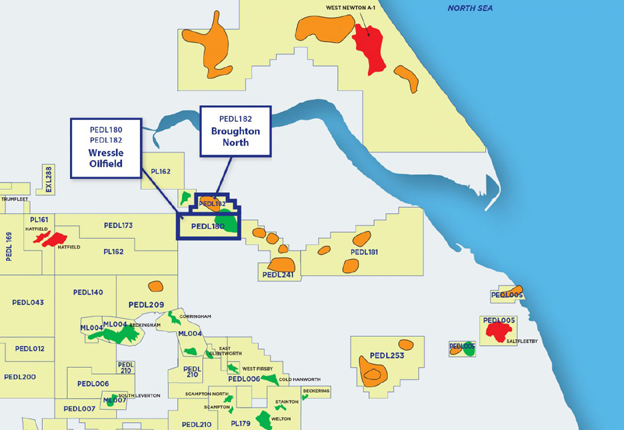Union Jack Oil, a UK focused onshore hydrocarbon production, development and exploration company, notes the West Newton Community and PEDL183 update presented to the West Newton Community Liason Group by Rathlin Energy (UK) on 23 September 2022.
Over the last number of months, data collected during the course of drilling the West Newton wells, which include core and oil and gas samples, wireline log and well test data, have been analysed by third party laboratories, CoreLab and Applied Petroleum Technology (UK) Ltd ("APT") and an engineering firm RPS Group Limited ("RPS"). The results from these analyses, in conjunction with internal evaluations, have been very helpful in informing Rathlin's upcoming programme of work.
Laboratory analyses have determined that the formation is very sensitive to aqueous fluids and that previous drilling of the West Newton wells with water-based mud has created near wellbore damage in the Kirkham Abbey reservoir, through the creation of very fine rock fragments while drilling that potentially plug up the natural porosity and permeability of the reservoir and have a detrimental effect on its ability to flow. Further analyses have determined that the use of dilute water-based acids during well testing will also have adversely affected the flow characteristics of the Kirkham Abbey reservoir.
These same tests demonstrate that by drilling the Kirkham Abbey reservoir with an oil-based drilling fluid, damage to the oil and gas reservoir can be minimised.
To that end, Rathlin has made applications to the Environment Agency for use of oil-based drilling fluids within the oil and gas bearing Permian section, for both the West Newton A and B sites. Oil based drilling fluids are included in the Standard Rules permit, which has been applied for at West Newton B site, whereas the current variation to the West Newton A site permit has been adapted to include oil-based muds in the same manner as in the Standard Rules permit. Determination of these permits are pending.
Analyses by ATP, of numerous oil and gas samples recovered from the West Newton wells during testing to date, along with evaluation of mud gases measured during drilling, utilising a proprietary software package, indicates that the Kirkham Abbey reservoir is predominately gas (primarily methane 90% + ethane 5%) with associated light oil (condensate).
The significance of this finding is that the requirement for trucking during production may be greatly reduced.
Following on from the laboratory analyses, Rathlin engaged engineering consultants RPS to undertake a detailed reservoir and completion programme study, based on the CoreLab and ATP results. RPS determined that by drilling with an oil-based mud system and extending the length of reservoir section penetrated by a well, the productive capability of each well will be enhanced.
RPS has modelled wells extending up to 1500 metres horizontally through the Kirkham Abbey reservoir. The modelled horizontal wells will also have a much greater likelihood of encountering significant sections of the reservoir with open natural fractures, which will also enhance the productive capability of the Kirkham Abbey reservoir.

Work programme
Rathlin's and our partners' technical teams are currently working to determine the optimum orientation for a horizontal well, which may be drilled from either the A or B sites.
Given the challenges with the global supply chain, long lead items such as steel casing for a horizontal well has already been ordered. The availability of drilling rigs capable of drilling a 1500 metre horizontal well is also being determined.
Field Development
The significance of the laboratory and engineering findings has important benefits in terms of the West Newton field development.
From a local resident perspective, a development with more gas and less oil will significantly reduce the volume of traffic associated with production and allow for the installation of a pipeline to deliver natural gas directly to the National Grid.
Domestically produced natural gas is, and will remain, a much-needed part of the energy mix as the UK seeks to reduce its reliance on foreign gas, whether delivered by pipeline or as Liquefied Natural Gas ("LNG") in ocean-going tankers.
The North Sea Transition Authority indicates that domestic UK gas production has less than half of the Emission Intensity of imported LNG. This is particularly important, as the UK seeks to reach its Net Zero 2050 targets.
Commercial production from West Newton could start as early as 2026, provided regulatory approvals are expedited and supply chain delays con be managed.
The anticipated recoverable gas resource at West Newton will have the potential to meet the daily gas demands of over 380,000 homes in the UK for many years to come. Based on OFGEM data indicating that an average 3-bedroom UK home consumes 7.9 Kwh/day of electricity and 32.9 Kwh/day of natural gas.'
Executive Chairman of Union Jack, David Bramhill commented:
"The content of the West Newton and Additional Prospects PEDL183 Onshore UK Competent Person's Report ('CPR') being Compiled by RPS is expected to be published during the week commencing 26 September 2022."
Background
Union Jack holds a 16.665% interest in the Rathlin Energy-operated PEDL183, located within the Western sector of the Southern Zechstein Basin, which is on trend with the prolific Hewett gasfield complex; West Newton was discovered in 2013 by the West Newton – 1 well ('A-1').
PEDL183 contains the West Newton A-1 well gas discovery, which has been further appraised by West Newton A-2, West Newton B-1 and the recently drilled West Newton B-1Z.
KeyFacts Energy: Union Jack Oil UK country profile
 KEYFACT Energy
KEYFACT Energy